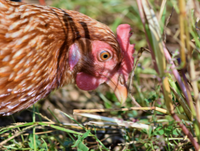Avian Influenza

11 November 2022

Last month (October), the Welsh Government declared an all-Wales Avian Influenza Prevention Zone to protect poultry and captive birds from a strain of Highly Pathogenic Avian Influenza (HPAI).
Now Powys County Council's Animal Health Team are reminding keepers of poultry and other captive birds that the prevention zone requires them to take appropriate and practicable steps including:
- Keeping kept birds off land that is known to be, or at high risk of being, frequented by wild waterfowl, or contaminated by their droppings or feathers
- Ensure the areas where birds are kept are unattractive to wild birds, especially waterfowl, for example, by netting ponds and surrounding areas and by removing wild bird food sources;
- Feed and water your birds in enclosed areas to discourage wild birds;
- Minimise movement of people in and out of bird enclosures;
- Clean and disinfect footwear, use foot dips before entering poultry enclosures, and keep areas where birds live clean and tidy;
- Ensure that all bedding, equipment, clothing and anything else that enters the areas where birds are kept are free of direct or indirect contamination with HPAI, which is mainly spread through bird droppings.
- Keep domestic ducks and geese separate from other poultry.
These requirements apply to all kept birds, including small flocks with fewer than 50 birds.
Keepers with more than 500 birds will also be required to take extra biosecurity measures, including restricting access to non-essential people, changing clothing and footwear before entering bird enclosures and cleaning and disinfecting vehicles.
The council's Animal Welfare Team are also asking members to reporting findings of dead birds to the Defra helpline on 03459 335577 so that it can be monitored by the Animal and Plant Health Agency (APHA).
Some of these wild birds will be collected by the APHA for surveillance purposes but not all birds will be collected.
If dead wild birds are not needed for avian influenza surveillance purposes and landowners have taken the decision to remove carcasses, it is the landowner's responsibility to safely arrange disposal. The council also recommends that consideration is given to removing carcasses at residential premises, in particular areas which may be accessed by children or pets.
Carcasses of dead wild birds should be disposed of in accordance with the relevant Animal By Products (ABP) requirements. If it is suspected that birds are infected with a disease which can spread to people or animals, such as avian influenza, the carcases should be disposed of as a category 1 ABP.
If dead birds are found on public land, it is the council's responsibly to arrange the disposal or carcasses. Members of the public are encouraged to report any dead birds found on public land by calling 01597 826031 or email trading.standards@powys.gov.uk
Cllr Richard Church, Cabinet Member for a Safer Powys, said: "The prevention zone was declared to reduce the risk of infection from wild birds so poultry and captive bird keepers must have the appropriate biosecurity measures in place.
"Poultry keepers should remain vigilant for any signs of disease in their birds or any wild birds and seek prompt advice from a vet if they have any concerns.
"The UK is currently in the midst of an unprecedented outbreak of Avian Influenza and the winter migration of wild birds to our shores means that the situation is likely to get worse before it gets better.
"It's important that the public report any dead wild birds to the Defra helpline for surveillance purposes and I would urge them to do so."
To find how to dispose dead wild bird carcasses correctly, visit https://www.gov.uk/animal-by-product-categories-site-approval-hygiene-and-disposal
Further information on AI can be found on the Welsh Governments website at https://gov.wales/avian-influenza-bird-flu




